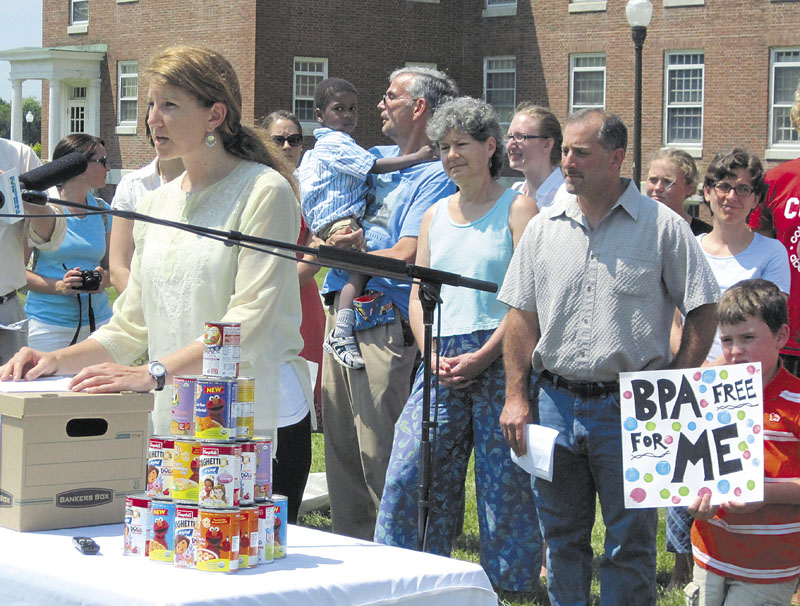AUGUSTA — More than a dozen mothers turned in signatures Thursday to try to compel the state Board of Environmental Protection to ban the chemical bisphenol-A from baby and toddler food packaging.
“No child should be exposed to the hormone havoc of BPA at the dinner table,” said Annie Colaluca, a mother of three from Waterville.
The chemical, known commonly by the acronym BPA, is a common additive used in some hardened plastics. Maine has already banned it from baby bottles, sippy cups and other reusable food and beverage containers. The groups are hoping the state will now extend that ban to cans and jars that hold baby and toddler foods.
The Alliance for a Clean and Health Maine, an umbrella organization for groups such as the Environmental Health Strategy Center and Natural Resources Council of Maine, organized the effort to gather more than 800 signatures as part of a citizen petition process. The state requires at least 150 valid signatures to be turned in before it will begin consideration of a new state rule.
The groups want the state to require that BPA be phased out of foods marketed to children under 3, including infant formula, baby foods and toddler foods. They point to studies that indicate that BPA is a hormone disrupter that is linked to cancer, obesity, learning disabilities, male infertility and early puberty in girls.
But others, including Gov. Paul LePage and the federal Food and Drug Administration, say the studies aren’t definitive, particularly when it comes to BPA’s effects on humans.
LePage made headlines last year when he said the “worst case is some women may have little beards” from being exposed to the chemical. On Thursday, LePage spokeswoman Adrienne Bennett said the administration still does not believe there’s ample scientific evidence to support a ban.
“As the Obama administration indicated in March, there remain serious questions about BPA studies as they relate to humans and the public health impact of BPA,” she said. “The governor supports scientific evidence which is conclusive; however, there is not yet a consensus among scientists about BPA. Additionally, we are uncertain about the safety of BPA alternatives. It is dangerous to let so many unknowns drive public policy.”
Bennett was referring to a March FDA statement that said while studies have raised questions about the safety of BPA, “there remain serious questions about these studies, particularly as they relate to humans.” The FDA called for more study and said it was not prepared to issue a final ruling about the chemical.
Susan Shaw, director of the Marine Environment Research Institute in Blue Hill and a professor in the Environmental Health Sciences Department at the State University of New York-Albany, said studies show that BPA can disrupt hormones in children, even at low levels.
“There’s almost a mountain of data that supports the fact that BPA is harmful to human health,” she said.
She said government agencies, and the FDA in particular, are slow to respond because of pressure from the industries that will have to comply with new rules.
“It’s not about the science; it’s about the politics,” she said. “We deserve more from our government leaders, more from the agencies that are protecting us.”
Those who stood outside the Maine DEP in the sweltering heat Thursday agreed.
“Well-documented science and further emerging data leave no doubt that, yes, BPA is harmful to fetuses, children and the developing brain,” said Steven Feder, a Boothbay Harbor pediatrician and president of the Maine Chapter of the American Academy of Pediatrics.
Mike Belliveau, president of the Environmental Health Strategy Center, said there are several safe BPA-free alternatives available now.
“The market has just begun to move away from BPA, so it’s a perfect time for public policy action to force the laggards to move and to ensure the safety of all alternatives,” he said.
Department of Environmental Protection Commissioner Pattie Aho accepted the petitions on Thursday and said the Board of Environmental Protection — a seven member citizen panel — will now begin the process of considering the rule. That will include a public hearing at a later date.
“This is democracy in action,” she said, greeting the petitioners and their children in the DEP lobby.
Aho said the department will work with the Maine Center for Disease Control on further study of the chemical as the board examines whether to put in place stricter standards. Now, baby food manufacturers are required to report to the state if they use BPA, and the department has followed up with companies that have not filed their reports on time, Aho said.
Two years ago, the Board of Environmental Protection named BPA a priority chemical under the state’s Kid-Safe Products Act, which led to the ban on its use in baby bottles and sippy cups.
“The market is responding, the manufacturers are responding,” Aho said. “Many of them are removing intentionally added BPA to their products as they can do so.”
Send questions/comments to the editors.


